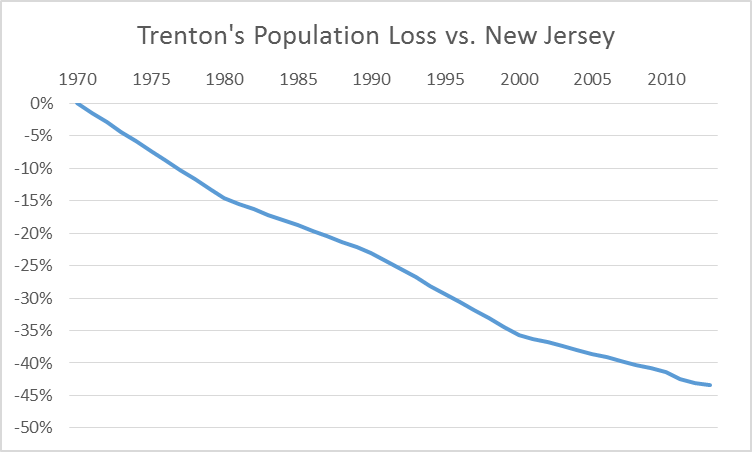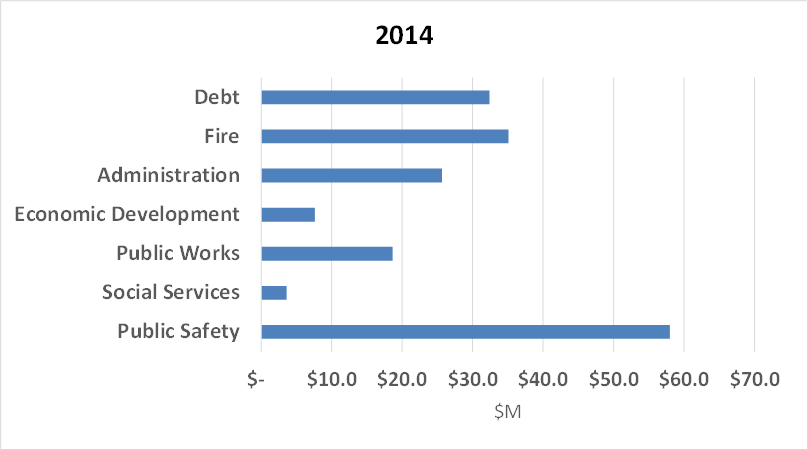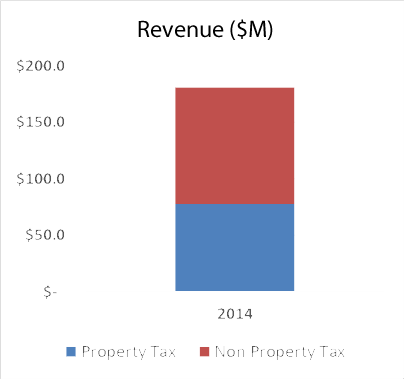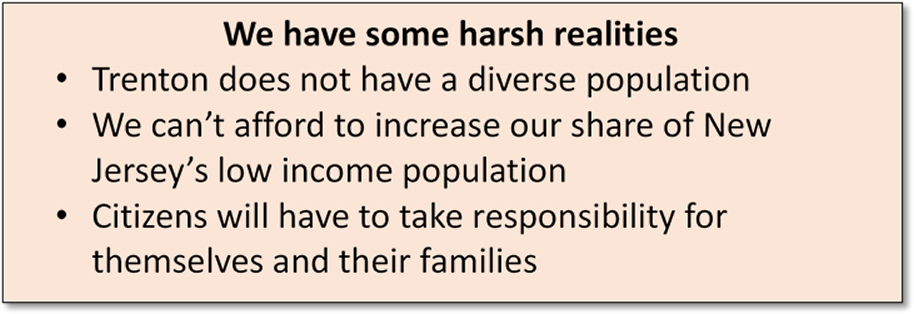We all know Trenton is in Rough Shape
Now that Mayor Jackson has taken office it’s squarely on his shoulders to not just talk but to show results in improving Trenton.
We all express our displeasure differently. Residents, business owners and those considering a move to Trenton say it in many different ways:
- “Things have gotten bad”
- “Restaurants are moving away”
- “Trenton used to be great”
- “My taxes are killing me”
- “It’s not safe anymore”
We all have emotional responses to the situation we’re in and it’s difficult to put our finger on what bothers us most.
If we really think about it though there are five key indicators of Trenton’s health. Five symptoms that show how well we’re doing. And if all five of these indicators started showing signs of improvement, all Trentonians would notice the city coming back to life. If we could see progress in these five areas we’d have hope again that would be contagious.
The indicators are all well-known statistics that are easily and regularly measured in Trenton. They are:
- Crime levels as measured by the FBI’s Crime Index
- Population growth as measured by the U.S. Census Bureau (in the case of Trenton, every year)
- Graduation rate as measured by the NJ Department of Education
- Median Household Income as measured by the U.S. Census, and
- Economic success as measured by our tax base
To be a successful Mayor, Eric Jackson must lead Trenton to show progress on these 5 measures. It’s not nearly enough to say “I’m working hard”. Mayors have said that before and the problem was they were working on the wrong things. Doing the smart thing is much more important than working hard on the wrong thing. Over the next several years I plan to do my part by reporting to Trentonians on Mr. Jackson’s progress on these basic measures. I’m looking for results not promises of results.
The following is my initial report.
Our people are leaving the city
Trenton’s 2012 census estimate is 84,447 residents
The most important measure is the simplest one, is Trenton such an attractive place to live that our population is growing. Unfortunately the current answer is NO.
- Since 2000 our population has declined by 1.2%
- Meanwhile New Jersey’s population has grown 5.4% in the same period
Relative to our neighbors, Trenton has become a less desirable place to live. Over the past 44 years Trenton has steadily under-performed with the State growing 43% faster than Trenton.

While New Jersey’s growth has accelerated Trenton’s population has shrunk. We benefit from the same factors that drive growth in the state so it is especially disappointing that Trenton continues to lose people. Some have pointed out that Trenton’s population loss has slowed, but that is blatantly misleading. It has only slowed because New Jersey’s growth has accelerated.
It will take an influx of new residents to begin the process of rebuilding our tax base. We have room to grow. At its peak in the 1920s, Trenton housed 140,000 residents.
Our economy is losing wealth
In 2011 Trenton’s tax base, the value of property on which we can charge a property tax, was $2,009,731,470. By 2014 it has declined to $1,993,783,800. This represents a .8% loss in ratables for the city.
The implications of this statistic are large. It means our economy is getting worse instead of better and most importantly, it means that our policies are not working.
We can never have a lower tax rate or afford to spend more money on parks, police and streets unless our ratables go up.
Our incomes are relatively low
Trenton’s Median Household Income is $36,727 (2012)
- This is in stark contrast to NJ’s median household income of $71,637, which is almost double that of Trenton’s.
- Hamilton’s median household income is $72,735
Worse yet, the percentage of households in Trenton with income over $200,000 is 1.6%,
- The compares poorly to 9.1% for New Jersey and 4.3% for Hamilton
- High income households spend money on amenities at a much higher rate than low income
Income levels are very important to the health of a city as they determine how much money residents will spend, which in turn, determine the attractiveness of a city to retailers and other amenities. While NJ’s median household income is double that of Trenton’s, NJ’s per capita retail spending is three times our rate. This means that retail spending falls off disproportionately to income.
Making Trenton attractive to retail and entertainment business is important as the presence of those amenities makes the city attractive to new residents and businesses but we won’t get new amenities without more spending power in the city.
Our children are dropping out of school
The Trenton school district’s 2013 graduation rate was 48.6%.
- This means that almost half of the students who entered 9th grade in 2009 graduated in 2013.
- There is no world in which this is healthy.
- It can be argued that fixing the schools isn’t a prerequisite for revitalizing the city. The easiest target market for new residents is the millions of people without kids. However, failing schools don’t help.
With 50% of our young adult population grossly under-educated, they are likely to become a drain on the economic future of our city. High school dropouts are more likely than graduates to turn to crime and create a social cost for the rest of us.
The cumulative effect of moving the graduation rate up to 75% could halve our crime problem in the long run if the correlations between dropout rate and crime follows.
Our crime rate is still high
Trenton’s crime problems have tracked the national trend downwards over the last decade.
Uniform Crime Reports for 2013 are 3443
- This is a decrease from 2012 of 14% which shows we’re moving in the right direction,
- However in 2013, Trenton set a murder record of 37 which placed it among the most dangerous cities in America.
- Meanwhile neighboring Hamilton had a crime index 2057 and only 1 murder in 2013.
There is a direct correlation between population decline and crime
In “CRIME, URBAN FLIGHT, AND THE CONSEQUENCES FOR CITIES”, economists Julie Berry Cullen and Steven D. Levitt found that each FBI index crime leads directly to one person moving out of an inner city, like Trenton. That’s bad enough but high income residents are 5 times more likely to leave due to crime than average. Families with children are 3 times more likely to leave. Finally crime rate is negatively correlated with depopulation, home values and per capita income.
These conclusions alone are quite damning for Trenton. However, it gets worse. If a city becomes depopulated, the crime rate goes up because the criminals stay behind. Also, because high income people leave, poverty becomes more concentrated.
We don’t have a lot of flexibility in our budget to fix things
Our expenses can’t change much
Debt, fire and police make up almost all of the budget and other functions are cut to the bone.

Our revenues can’t change much either
Property tax makes up less than half of our budget so any change in the budget will have a large effect on taxes.

This is a complicated problem
A city is a complex system. When dollars are invested in crime fighting in one part of the city, street paving may go undone in another. That lack of street paving may have a larger or smaller impact on investment in the city than the crime fighting.
Investment will lead to a higher tax base but not for some time. In the meantime, there may not be enough money to fund basic services and taxes have to be raised.
Higher taxes will devalue the investment, leading to lower than anticipated increases in the tax base.
And so it goes in any economy. 1st and 2nd order causes and effects are at play making seemingly simple policy decisions difficult. This is especially problematic in an environment where the public doesn’t appreciate the non-intuitive nature of such decision-making.
How can we turn this city around?
We’re in a vicious cycle
- High crime leads to depopulation and greater expense in policing
- Depopulation leads to higher taxes which drives people away faster
- In a city where almost half of its budget is fixed on debt services and benefit obligations, our ability to fund discretionary budget items such as city services is limited
- Lack of services drives people away even faster thus creating a vicious cycle.
How can we turn a vicious cycle into a virtuous circle?
- A virtuous circle is the opposite of a vicious cycle
- Good things build on one another
- Eventually enough good things happen that they overwhelm the bad things and the city grows despite itself
- This is happening in some cities in America like New York and Washington and even New Brunswick and Jersey City









Hi Dan,
This is great stuff.
Matt Held
I’m with you on virtually every statement except for your first “Harsh Realities.” Trenton is highly diverse. In fact on many dimensions were are much more diverse that most communities in NJ:
African American: 52%
Hispanic: 33%
White: 15%
Other 2%
70% of the population (age 25+) has a high school diploma; 11% have a college degree
23% are foreign born
38% of Trenton businesses are female owned
23% of Trenton businesses are African-American owned
13% of Trenton businesses are Hispanic owned
Just about 9 percent of the population is over age 65 (vs. NJ~14%)
But the question is, what is to be made of the diversity? You raise it as a harsh reality suggesting it’s a problem, but if you agree that we are indeed more diverse that your statement asserted, how do we capitalize on it as you had presumably hoped?
The city’s graduation rate is abysmal. There is some question about the actual graduation rate, but no matter how much the estimate is off, we know we are doing a poor job in this area. However, the troubling point about improving our education system is that the ’successes’ — and there are many, typically do not return to Trenton. (There are, of course, exceptions, but many youth who get a chance to leave, do so and their escape become permanent. Right now there is nothing — short of a foundering economy — to draw them back to Trenton. Most of best and brightest leave (and we end of co-existing with the dropouts).
I am not saying we should not pay attention to schools. We must, if only to retain families of means who have the option to move when their children become of school age. However, in the absence of real employment or entrepreneurial opportunities in Trenton, the result of an improved school system will be a ever larger pool of graduates who must leave the city to survive.
People focus on racial diversity like it’s 1970. I’m much more worried about economic diversity. That’s the diversity that matters.
It’s hard to know exactly but according to census and BLS numbers there may be as few as 20 households in Trenton with income over $200,000. That’s a shockingly low number. When coupled with the analysis I cite of spending habits among households with disposable income we can see why Trenton punches so far below its weight in terms of retail amenities.
Bernard,
The point of the graduation rate isn’t really making Trenton more attractive due to schools. As you point out, the successes will leave anyway and secondly Trenton won’t be more successful in its schools than our neighbors in our life-time.
The real win is to stem the flow of drop-outs onto Trenton’s streets. The poor success rate fuels our crime problem.
It is what it is. Now the problems have been identified, so how do you remedy the situation. What’s within reason. The real problem is facing the facts. You can’t abandon the 70% for the 30%, or vice versa. You can’t cater to 20 people leaving the rest of the polulation put down or dejected. Think about the 11% that are here only because we haven’t given up on the City or that we work for City or State government, while the City grants exemptions to some of its highest paid employees. One thing is clear, start by being realistic, the situation is apparent, and it is what it is. Now for the remedy, leadership with true and realistic vision, instead of foolish dreams of grandeur. Start with what you have and make it work.
People have a complete misunderstanding. Economic prosperity does not radiate from city hall. It is impossible for one person[mayor] or a small group of people [committee/transition team ]to plan and organize the economic future of an entire city or region. Formally it’s called “Central Planning”
The solution ? Economic Freedom. Once economic freedom is established social,cultural and political freedom automatically follows. Until economic freedom is established neither social or political freedom can exist.
broken homes; divorce, lack of church attendance, school attendance, neglect of family members all contribute more than dollars and cents to these social difficulties..(i lived-in mercerville for many years)….
[...] 2014 Report Card: We all know Trenton is in Rough Shape Share and Enjoy: Posted in Taxes and Budgets, Vision and Management | Tags: Crime Rate, [...]